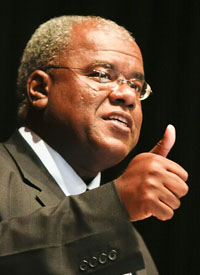 The Council of the University of the Free State (UFS) is pleased to announce that it has agreed to offer the post of Rector and Vice-Chancellor of the UFS to internationally renowned academic Prof. Jonathan Jansen, making him the first black Rector and Vice-Chancellor of the institution in its 105-year history.
The Council of the University of the Free State (UFS) is pleased to announce that it has agreed to offer the post of Rector and Vice-Chancellor of the UFS to internationally renowned academic Prof. Jonathan Jansen, making him the first black Rector and Vice-Chancellor of the institution in its 105-year history.
This decision was taken by an overwhelming majority, signalling the commitment of the UFS to continue as a world-class university that will at the same time pursue the objective of transformation in the interests of the entire university community.
Announcing the decision today (Friday, 13 March 2009), the Chairperson of the UFS Council Judge Faan Hancke said the UFS was privileged to have had candidates of the highest calibre apply for the position. An international executive search agency specialising in academic appointments had assisted the UFS Council in its search for top quality candidates.
“This has been a truly vibrant, transparent and participatory selection process, which has resulted in our institution being able to make this historic appointment,” said Judge Hancke.
“I appeal to the entire UFS community, staff, students and alumni to support the new Rector and Vice-Chancellor in his endeavour to lead this institution to greater heights. This is an important moment in the life our institution. We should celebrate this achievement as a united university community,” Judge Hancke said.
“As a council we are now unanimously behind Prof. Jansen and want to assure him of our full support,” Judge Hancke said.
In response to his appointment, Prof. Jansen said it was a great privilege and that he would really do his utmost best to be of service to the UFS.
In his statement of intent which was submitted earlier as part of his application for the post, Prof. Jansen indicated that if appointed he “would be deeply honoured to lead one of South Africa’s great universities”.
“The University of the Free State has gained a national reputation for three things: [1] its turnaround strategy in terms of financial stability in a context where external funding has been uncertain; [2] its research strategy which has seen a steady and impressive growth in research outputs; and [3] its managerial decisiveness in the wake of the Reitz incident,” Prof. Jansen said.
Regarding the challenges facing the UFS, Prof. Jansen said in his statement of intent: “The UFS has to find a way of integrating classroom life while at the same time ensuring the promotion of Afrikaans, an important cultural trust of the institution, as well as Sesotho and other indigenous languages. It has to bring academic staff, administrative staff, workers, students, as well as the parent community behind a compelling vision of transformation that works in the interest of all members of the university community. And it has to rebuild trust and confidence among students and staff in the mission of the university.”
Prof. Jansen is a recent Fulbright Scholar to Stanford University (2007-2008), former Dean of Education at the University of Pretoria (2001-2007), and Honorary Doctor of Education from the University of Edinburgh. He is a former high school Biology teacher and achieved his undergraduate education at the University of the Western Cape (BSc), his teaching credentials at UNISA (HED, BEd) and his postgraduate education in the USA (MS, Cornell; PhD, Stanford).
He is also Honorary Professor of Education at the University of the Witwatersrand and Visiting Fellow at the National Research Foundation.
His most recent books are Knowledge in the Blood (2009, Stanford University Press) and his co-authored Diversity High: Class, Color, Character and Culture in a South African High School (2008, University Press of America). In these and related works, he examines how education leaders balance the dual imperatives of reparation and reconciliation in their leadership practice.
Media Release
Issued by: Lacea Loader
Assistant Director: Media Liaison
Tel: 051 401 2584
Cell: 083 645 2454
E-mail: loaderl.stg@ufs.ac.za
13 March 2009